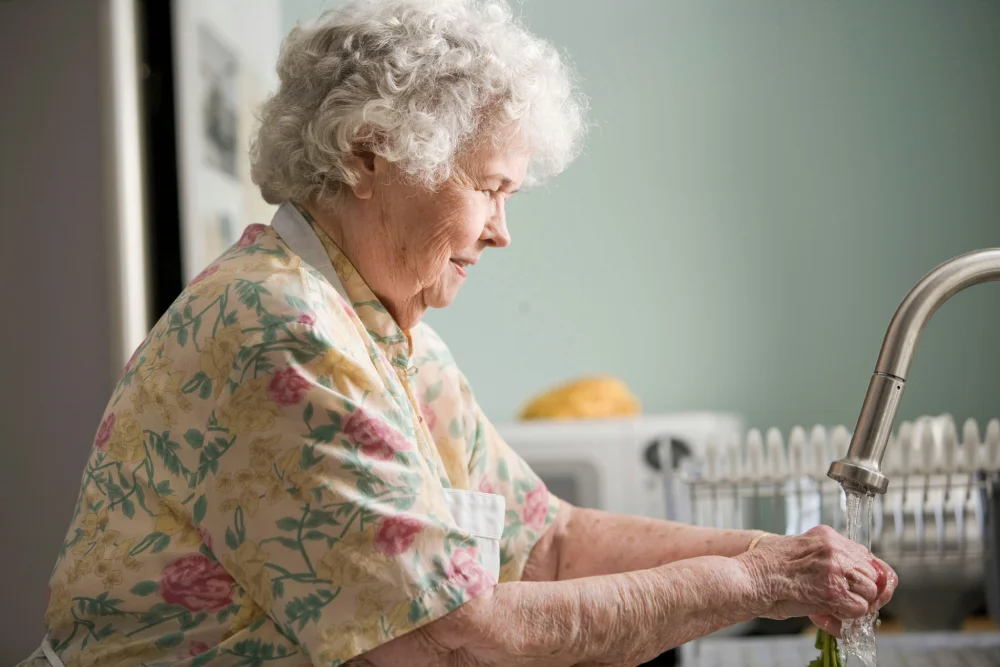Do you or a loved one require extra living support due to ageing, illness or disability? The process of finding the best provider and service for you can be daunting, especially if you find it hard to visualise all the steps involved.

You may be considering the benefits of home care, or you’ve already booked in with a provider, and you’re wondering what to expect on an ongoing basis. Either way, we’re here to help and make this process easier.
Read on for our quick overview of home care services, including what they are, how to arrange them, and what they may look like day to day.

For personalised advice, contact our team at Aspire UK today.
What Is Home Care and How Is It Different From Other Forms of Care?
If you or a family member needs practical support because of illness or disability, there are a number of options available to you. According to the NHS website, these options include help at home from a paid care worker, having home adaptations, and different types of housing including care homes.
To help you with your decision-making process, let’s unpack the definition of home care and explore some key alternatives.
Home Care, Including Home Health Care
Home care in the UK is known by a few different terms, including care at home, in-home care, social care or domiciliary care. The term home health care is also used to describe home care that is medical in nature and provided by licensed medical personnel, including nurses and doctors.
Home care services provide people with personalised care and support in the familiar and comfortable environment of their own homes. These services are tailored to suit the specific needs and preferences of each individual, but generally include assistance with daily living tasks, medical management, companionship, and overall well-being.
Home care is delivered by home care provider, like Aspire UK, or by workers arranged privately by clients. The service they provide can take a range of forms, including help at home, live-in care or overnight care.
We find home care is particularly beneficial for those who prefer to “age in place” or recover from illness or injuries without the need for relocation to a care home facility. They also ensure a level of independence for people with a range of disabilities or health conditions, including Physical and Learning Disabilities, Autism, Acquired Brain Injury, Spinal Injuries, Alzheimer’s, Dementia, Motor Neuron Disease (MND) or Multiple Sclerosis (MS), Parkinsons.
If you or a family member are finding it difficult to cope with daily routines like washing, dressing, meal preparation or medication management but are hesitant to move into a care home, home care services may be a great option. Designed to be tailored and flexible, they ensure the wellbeing and safety of individuals while promoting their independence and dignity.
Home Help
Home help is a separate service that may be free or provided for a fee. It is often provided by charities like the Royal Voluntary Service, the British Red Cross or Age UK.
Like home care, this service involves assistance with day-to-day domestic tasks, such as cleaning, washing up, doing laundry and gardening. However, compared to home care its scope tends to be more limited.
Adapting Your Home or Moving to a New Home
In many cases, people who need additional living support, including older people and people with disabilities, find their greatest challenge is their immediate environment. Their house may be too big and difficult to maintain, or unsuited to their physical needs.
If you or a family member are in this position, there are a range of options available aside from home care or care homes. These options include buying or renting an adapted property, moving to another council or housing association property, sheltered housing, or homeshare schemes.
On a smaller scale, you may also choose to adapt your home with stairlifts, handrails or extra security, or use household gadgets and equipment designed to help you cook, clean and get dressed.
Care Homes, Including Residential and Nursing Homes
Care homes in the UK are either residential or nursing homes, or a combination of the two. They may be run by private companies, charity organisations, or sometimes by local councils.
Residential homes provide accommodation and personal care, such as help with washing, dressing, taking medicines and going to the toilet.
Nursing homes also provide accommodation and personal care, but with the additional provision of one or more qualified nurses on duty to deliver nursing care. They may also offer services for people who need additional or complex care and support, including people with severe learning or physical disabilities or a complex medical condition.
If you or a family member are struggling to live alone (even with help from family and friends) and/or require specialist medical attention, a care home may be the right choice for you.
How Do I Find a Home Care Provider and Arrange for Services?
If you have decided a home care service is the best option for you and your family, this is the general process you may follow.
- Undertake research: First, you may wish to research websites or directories containing home care services, including those in your area. These may include the NHS website, your local authority, or the Care Quality Commission (CQC), which monitors, inspects and regulates health and adult social care services in England.
- Determine your budget: Home care is either arranged and paid for by the individual or, if they are eligible, by their local council. It’s worth taking the time to understand your circumstances, including whether your council can help with a care needs assessment.
- Understand your preferences: Points to consider when you are choosing care include your preferred level of care (for instance do you need 24/7 care or daily check-ins?), whether providers offer specialised care in line with your needs, and which elements of you or your loved one’s current lifestyle you’d like to maintain.
- Arrange a face-to-face consultation: If you find a home care service that suits you, arrange at least one opportunity to ask them a range of questions. This is your chance to understand their culture, values and operations, as well as their approach towards staffing and their communication with clients and families.
- Finalise your new care package: You will have the opportunity to review and sign a contract. Your provider will then start your arrangement and ensure all practical requirements are in place.
What Services Are Included in Home Care?
You may be wondering what to expect on a day-to-day basis from home care service, particularly one provided by an agency.
This service looks different for different people, and will be tailored to each individual’s needs. However, you can expect that home care workers may visit your home to assist with one or more of the below tasks.
- Personal care: Your care worker may assist with bathing, showering, toileting, hair brushing, grooming, dressing, and other personal hygiene tasks.
- Meal preparation and serving: Your care worker may help prepare and serve meals, snacks and drinks.
- Medication assistance: They may assist with reminders to take medication at the correct times or with administering medication.
- Light domestic duties: This is likely to involve tasks such as laundry, light cleaning, and tidying up.
- Companionship: Your care worker may spend time with you and help facilitate enjoyable activities like gardening, playing board games, watching movies, and taking you to the cinema or pub.
- Shopping and personal errands: They may also assist with performing errands, such as collecting prescriptions or pensions.

What to Expect From Home Care Providers
The exact arrangement and schedule your home care provider adheres to will be tailored to suit your specific needs and preferences. However, you can expect that your home care worker will demonstrate respect, care and consistency through a range of actions, including the below.
- Arriving and leaving on schedule
- Announcing their arrival via knocking and ringing
- Bringing an identity card
- Ensuring the safety and security of any keys not kept in the home, and the confidentiality of any entry codes
- Performing their expected duties to a high standard
- Having an action/contingency plan if they are unable to get into the home or in the case of an accident or emergency.
Learn More About Home Care Services With Aspire UK
At Aspire UK, we know that staying at home is a priority for many of our clients. Our goal is to help people maintain their independence and continue to do the things that bring joy and fulfilment to their lives.
If you are considering home care services for yourself or a family member, please don’t hesitate to reach out and get your questions answered in a free consultation with our friendly team.













